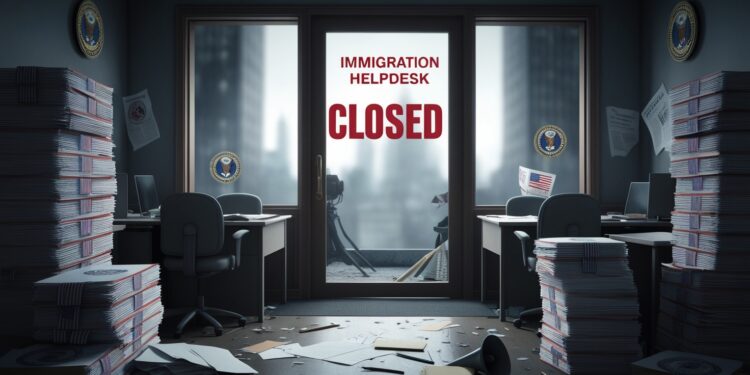In a development causing widespread concern across the immigrant community, particularly among Indian nationals and tech professionals in the United States, the U.S. government has disbanded the Office of the Citizenship and Immigration Services (CIS) Ombudsman—a critical helpdesk that provided much-needed assistance to thousands of individuals applying for H-1B visas, green cards, and other immigration benefits.
The office, housed within the Department of Homeland Security (DHS), served as an independent problem-solving unit that assisted immigrants and their attorneys in resolving complex immigration issues, often when no other agency would provide timely intervention. Its sudden closure has left many visa applicants without a clear path for addressing procedural delays, errors, and systemic issues within the U.S. immigration system.
What Was the CIS Ombudsman Office?
The CIS Ombudsman office played a pivotal role in supporting visa applicants who faced obstacles in their immigration journey, particularly when applications were stuck in long processing queues, misfiled, or returned due to technical errors. Established to enhance accountability within the United States Citizenship and Immigration Services (USCIS), the office operated independently and focused on ensuring fairness, accuracy, and responsiveness within the system.
In the fiscal year 2023 alone, the office handled around 30,000 requests for assistance, covering a wide range of issues including green card delays, incorrect notices, and lost documentation.
For many applicants—especially those on work-based visa tracks like the H-1B, or on student visas (F-1) transitioning to employment—this helpdesk was not just a convenience; it was a lifeline during bureaucratic limbo.
A Critical Resource for the Indian-American Tech Workforce
The decision to disband the office has triggered significant concern among Indian IT professionals and their legal representatives. Indians account for a substantial proportion of H-1B visa holders in the U.S., and many of them are in long queues for permanent residency (green cards). These individuals have historically leaned on the CIS Ombudsman to resolve errors that could jeopardise their work status, including incorrect approvals, denial notices, and documentation mismatches.
Rajiv S. Khanna, a Virginia-based immigration attorney, noted that the closure removes a vital check in the system. “When visa holders had no other avenue to address mishandlings by USCIS, the Ombudsman’s office stepped in. The closure strips away a critical support layer for legal immigrants,” he explained.
Why Was the Helpdesk Disbanded?
According to DHS, the decision to shut down the helpdesk was part of an internal restructuring effort aimed at streamlining immigration-related communications. However, critics argue the closure aligns with a broader trend of policy rollbacks under the Trump administration that have placed additional barriers in the path of legal immigration.
While no replacement mechanism has been formally introduced, applicants are now being redirected to USCIS customer service, which is already overwhelmed and not equipped to handle complex escalation requests.
“This is not about cutting red tape—it’s about cutting access to help,” said Sharvari Dalal-Dheini, senior director of government relations at the American Immigration Lawyers Association (AILA). “The Ombudsman’s office was one of the few places where visa holders could get support from people who understood the legal nuances.”

Real-Life Consequences for Immigrants
The closure is already having ripple effects across the U.S. immigration landscape. Applicants stuck in procedural bottlenecks or dealing with documentation issues no longer have a dedicated channel to resolve time-sensitive matters.
For instance, a tech worker awaiting green card adjudication may now face extended delays with no option to expedite or correct errors unless they file a lawsuit or pay additional fees for premium processing—options not feasible for every applicant.
Immigration attorneys also note that frequent USCIS errors, such as misspelled names, incorrect case status updates, or lost notices, were regularly escalated and resolved through the Ombudsman office. Without this avenue, these issues now risk going unresolved, delaying careers, family reunifications, and even legal status in the country.
Concerns from Legal and Business Communities
The tech industry and legal experts are expressing concern over what they see as a pattern of increasing inaccessibility in U.S. immigration services. As delays have become more common, legal support mechanisms have not kept pace—leaving foreign professionals and their employers exposed to uncertainty.
In a statement, the Immigration Voice advocacy group called the move “a step backward for immigration fairness,” arguing that transparency and problem resolution are crucial for maintaining confidence in the legal immigration process.
“The Ombudsman wasn’t a privilege—it was a necessity,” the group’s representative said. “Especially for law-abiding, tax-paying professionals who are contributing to the U.S. economy.”
What This Means for H-1B and Green Card Applicants
With the helpdesk now gone, many immigrants must rely on conventional USCIS customer service channels, which have long been criticised for delayed responses and generic replies that often do not address the specific nature of a case.
The alternatives are limited. Many applicants are now forced to consider:
- Filing lawsuits (mandamus actions) to compel USCIS to act
- Requesting congressional assistance from elected representatives
- Upgrading to premium processing, where eligible, at significant cost
- Hiring private attorneys to navigate issues that were once handled by the Ombudsman for free
This adds financial and emotional strain to individuals already dealing with the complexities of the immigration system.
The Bigger Picture: A Tighter Immigration Landscape
The closure of the CIS Ombudsman office reflects a larger shift in U.S. immigration policy under the Trump administration. Over the past few months, a series of regulatory changes, application backlogs, increased denials, and stricter scrutiny have made the legal immigration process more challenging than ever.
For Indian nationals, the green card backlog can stretch well over a decade, particularly in the EB-2 and EB-3 employment-based categories. In this context, the absence of a responsive agency to help resolve bottlenecks is more than an administrative inconvenience—it could mean the difference between maintaining legal status or being forced to leave the country.
What Lies Ahead?
There is growing pressure on the administration to reconsider the decision or replace the Ombudsman office with an equally effective mechanism. Immigration lawyers and advocacy groups have urged Congress to intervene and restore a platform that supports applicants navigating a system that is both opaque and increasingly adversarial.
In the meantime, affected individuals are being advised to:
- Stay informed of any upcoming changes in USCIS policy
- Keep detailed records of all correspondence with immigration services
- Consult with qualified attorneys before taking critical steps
- Engage with local representatives to voice concerns
The coming months will likely see continued legal challenges and lobbying efforts aimed at ensuring that visa holders and green card applicants are not left in the dark when they face obstacles in the system.
The shutdown of the CIS Ombudsman’s helpdesk represents a significant setback for transparency and support in the U.S. immigration process. For the thousands of H-1B visa holders, international students, and green card applicants who relied on its services, the absence of this support structure could make navigating an already complex process even more daunting. As immigration continues to shape the American workforce and society, ensuring access to fair and timely assistance must remain a priority.











